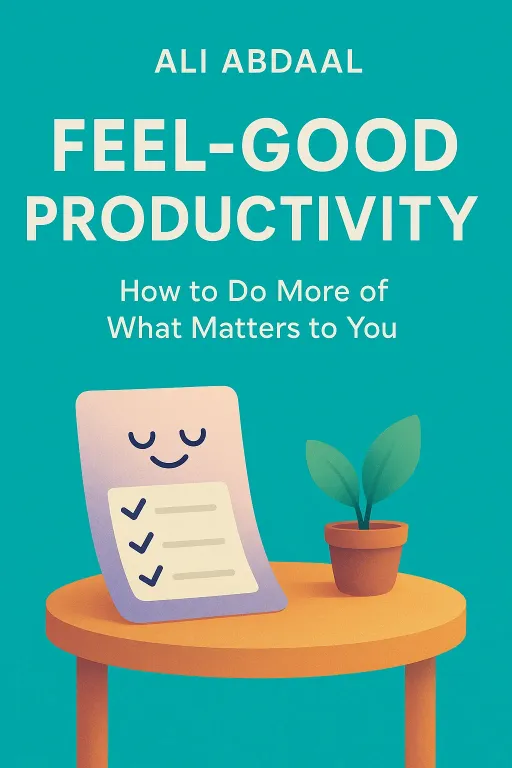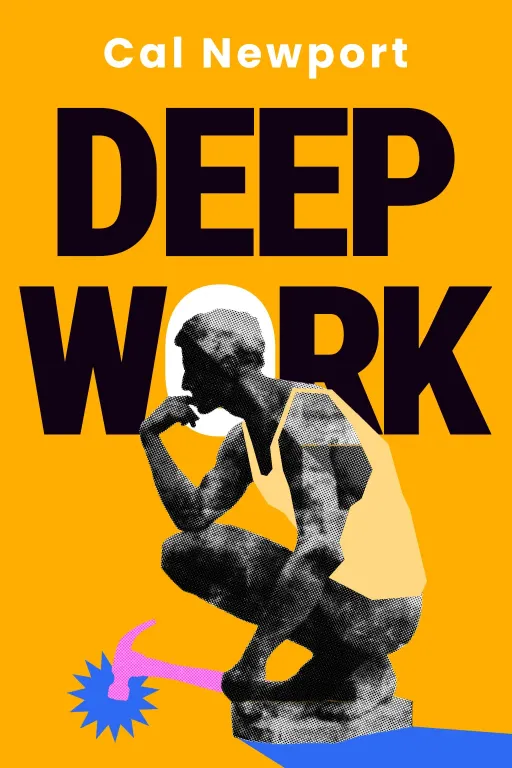
Productivity, Remixed: The Science of Feeling Good to Achieve More
8 minGolden Hook & Introduction
SECTION
Nova: We've all been there, right? Staring at a to-do list that feels like a mountain of chores, and the only 'motivation' we can find is the crushing pressure of a deadline. But what if we've been looking at productivity all wrong? What if the secret to getting more done isn't about working harder, but about feeling? What if you could make your work feel like play?
Osa : That sounds like the dream, honestly. The idea that productivity could be joyful feels so opposite to everything we're taught about the 'hustle' and the 'grind.'
Nova: Exactly! And that's the radical idea behind Ali Abdaal's book, "Feel-Good Productivity," and it's what we're exploring today with our wonderful guest, Osa. The book flips the script on us. It argues that success doesn’t lead to feeling good. Feeling good leads to success.
Osa : I love that. It’s a huge mindset shift.
Nova: It is! And it's a game-changer for anyone, especially ambitious young people like you, Osa, who want to achieve big goals without burning out. So today, we'll dive deep into this from two powerful perspectives. First, we'll explore how to energize our work by treating it as 'Play,' and then we'll discuss how to build unstoppable confidence by flipping the 'Power' switch in our minds.
Deep Dive into Core Topic 1: The Power of Play
SECTION
Nova: So let's start with that first energizer, which might sound a little counterintuitive: Play. Osa, when you think of 'productivity,' does 'play' even enter the picture?
Osa : Not at all. They feel like total opposites. Play is what you do when the work is done. It's the reward, not the process.
Nova: That's what most of us think! But the book makes a compelling, scientific case that infusing our work with play is one of the fastest ways to boost our energy, creativity, and, yes, our productivity. And the best way to understand this is through the incredible story of the physicist Richard Feynman.
Osa : Oh, the Nobel Prize winner?
Nova: The very same. So, picture this: It's the late 1940s. Feynman is a professor at Cornell. He's already a genius, having worked on the Manhattan Project, but he's completely burned out. He feels bored by physics, like his passion is just… gone. He's just going through the motions.
Osa : I think a lot of people can relate to that feeling, even if they're not physicists.
Nova: Totally. So one day, he's sitting in the university cafeteria, feeling listless, and he sees a student throw a dinner plate into the air. He notices that as the plate spins, the red Cornell logo on the rim is wobbling around much faster than the plate itself is wobbling. And something in his brain just clicks.
Osa : Just from a spinning plate?
Nova: Just from a spinning plate! He gets curious. He starts thinking, "You know, I used to enjoy physics. I used to with it. It didn't have to be important, it just had to be interesting and amusing for me to play with." So he decides, right then and there, to forget about doing 'important' work. He goes back to his office and just starts scribbling equations to figure out the wobble of that spinning plate. For fun.
Osa : He was just playing.
Nova: He was just playing! His colleagues thought he was wasting his time on something trivial. But he was having a blast. And that playful, no-stakes exploration of the wobbling plate led him directly to the insights that formed his work on quantum electrodynamics. It literally led him to his Nobel Prize.
Osa : Wow. That's incredible. So his breakthrough came from giving himself permission to be 'unproductive,' in a way. It reminds me of what you see with artists like Taylor Swift. Her 'eras' feel like these huge, elaborate games she's playing. She's not just writing songs; she's building a whole world, with clues and stories and aesthetics. That must be so much more energizing than just thinking, 'I have to write another album.'
Nova: That's a perfect connection, Osa! It's exactly the book's point. Abdaal suggests we ask ourselves a simple question when facing a task we dread: 'What would this look like if it were fun?' It's not about turning your tax return into a literal board game, but about finding an element of fun, curiosity, or adventure within it.
Osa : So for someone studying or working on a project, it could be as simple as using different colored pens, or turning research into a 'detective mission'? It's about lowering the stakes, just like Feynman did.
Nova: Exactly! The book quotes the philosopher Alan Watts, who said, "Don't be serious. Be sincere." You're still dedicated to the task, you're sincere about it, but you're not crushing yourself under the seriousness and the weight of the outcome. You're finding the fun in the process.
Osa : That changes everything. It makes the journey the reward, not just the destination.
Deep Dive into Core Topic 2: The Confidence Switch
SECTION
Nova: And that idea of lowering the stakes and not crushing yourself is the perfect bridge to our second energizer: Power. Because often, what crushes us is fear and a lack of confidence. The book redefines power not as dominance over others, but as personal empowerment and control over your own life.
Osa : Which is something I'm really focused on building—that inner self-confidence.
Nova: Well, you'll love this. The book offers a super practical technique for this, and again, it comes from the author's own life. Before he was a doctor and productivity guru, Ali Abdaal worked as a walkaround magician at parties.
Osa : No way!
Nova: Yes! And he was terrified. He describes the feeling of pure dread, having to walk up to a group of strangers, interrupt them, and perform a trick, all while his inner voice was screaming, "You're going to mess this up! They think you're an idiot!"
Osa : That sounds like my worst nightmare.
Nova: Mine too! So, to cope, he developed what he calls the "confidence switch." In those moments of panic, he would take a deep breath and ask himself one question: "What would it look like if I were really confident at this?" He'd picture a confident magician—someone with swagger, who was charming and in control. And then, he would simply that part.
Osa : So he would just pretend?
Nova: He would embody it. He'd walk up with a smile and a slight swagger, deliver his opening line with a bit of flair, and handle the cards as if he'd done it a million times. And the amazing thing was, the of confidence started to create the genuine of confidence. The external performance changed his internal state.
Osa : That's so practical. It makes confidence a verb, not a noun. It's something you, not just something you have. I'm immediately thinking of Serena Williams.
Nova: Go on, that's a great connection.
Osa : Before a crucial match point, you can see that shift in her posture, her expression. It's a conscious decision to embody power. She's not waiting to feel confident; she's to be. She's flipping that switch.
Nova: Yes! She's flipping the switch! That's the perfect example. The book cites research showing that even our self-talk—literally becoming our own hype-person with phrases like "You can do this!"—measurably improves our endurance and performance. It's about creating your own evidence of competence through your actions and your thoughts.
Osa : So the fear doesn't have to disappear? You just act in spite of it by adopting this confident persona?
Nova: Precisely. The book actually calls this the 'Batman effect.' There was a study where young kids were given a boring, difficult task. The kids who were told to pretend they were Batman while doing it persevered for much longer and were more focused than the other kids.
Osa : That's hilarious and brilliant.
Nova: Isn't it? By stepping into a role, you create psychological distance from your own fear and self-doubt. So for you, Osa, or for anyone listening, it could be asking, "What would the most confident version of me do right now?" And then just doing that.
Osa : I love that reframe. It's not 'fake it 'til you make it,' which can feel dishonest, but more like 'act it 'til you become it.' The action leads the feeling.
Synthesis & Takeaways
SECTION
Nova: So we have these two incredible, practical tools to make productivity feel good. First, we can inject 'Play' into our work to make the process itself energizing and creative, just like Richard Feynman did with his spinning plate.
Osa : And second, we can flip the 'Power' switch in our minds to consciously build our own confidence and act with empowerment, just like Serena Williams on the court or a magician at a party.
Nova: Exactly. It’s about shifting from forcing ourselves to do things to finding ways to to do them. It’s a kinder, more sustainable, and ultimately more effective path.
Osa : I think the challenge for all of us, then, is to try a small experiment. This week, pick one thing you've been putting off. It could be an assignment, a workout, anything. And just ask yourself: 'What would this look like if it were fun?'
Nova: I love that. A simple question.
Osa : Or, before you do something that scares you—maybe it's a presentation or a difficult conversation—take one deep breath and ask, 'What would the most confident version of me do?' And then take that first step. See what happens. It's just a data point, right?
Nova: It's just a data point. A low-stakes experiment. The perfect way to start feeling good, and getting more done. Osa, thank you so much for these amazing insights today.
Osa : This was so much fun. Thank you, Nova.









